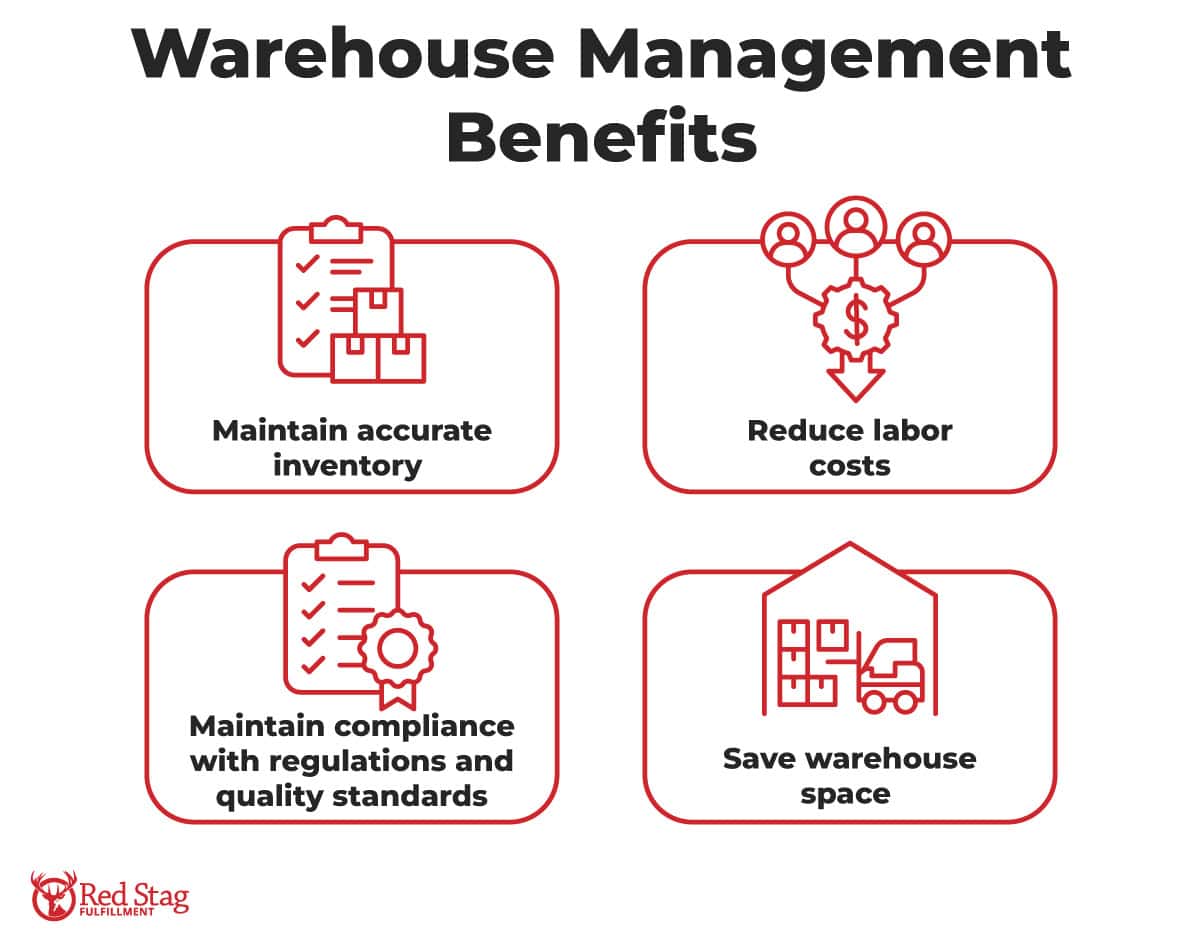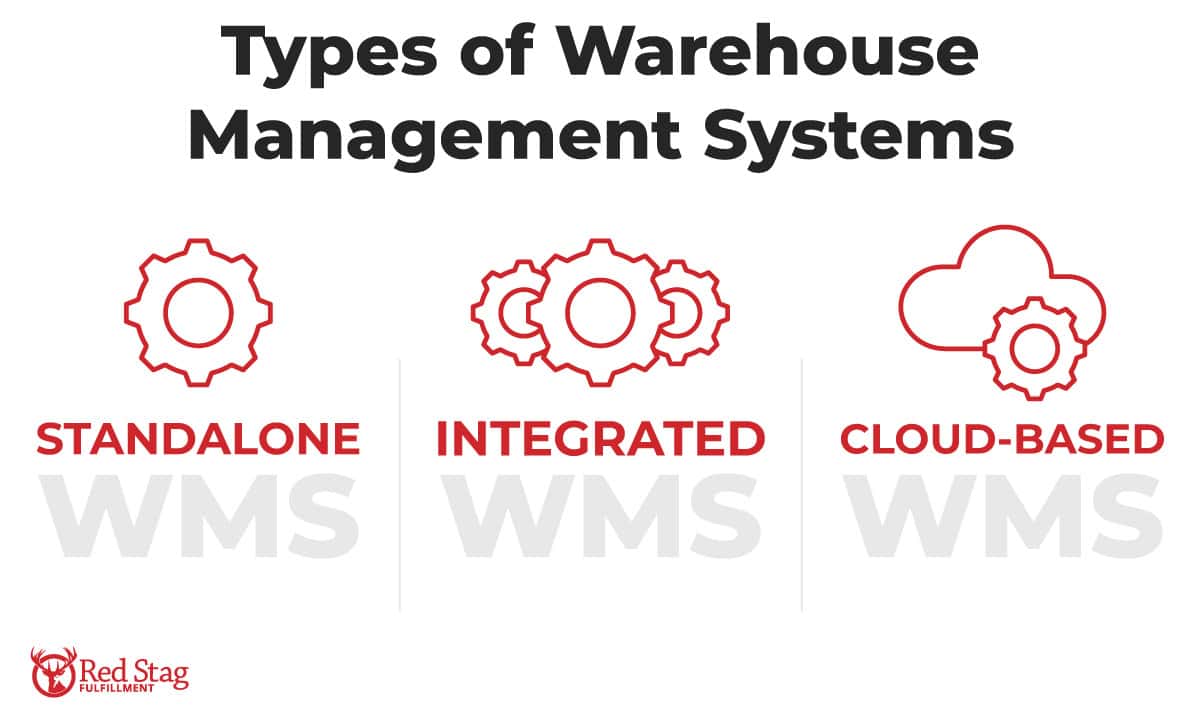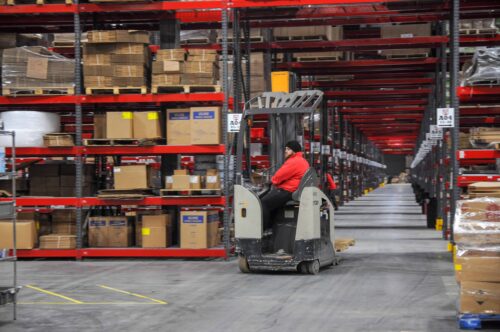Is your warehouse a source of stress and inefficiency? You’re not alone.
Many businesses struggle with warehouse management, but it doesn’t have to be that way.
This post will walk you through the basics of warehouse management and its importance. By the end, you’ll have the knowledge to transform your warehouse into a well-oiled machine.

TL:DR:
Key takeaways

Warehouse management coordinates inventory activities to maximize efficiency and fulfill orders quickly.

Effective management improves inventory accuracy, productivity, and customer satisfaction.

Key components include receiving, organizing, picking, packing, and shipping inventory.

Warehouse Management Systems automate processes and provide real-time inventory visibility.

Regularly track KPIs like inventory accuracy and order pick accuracy to improve performance.
What is warehouse management?

Warehouse management is the process of coordinating all activities within a warehouse, including inventory management. It handles how the warehouse receives, stores, and ships inventory.
Warehouse management aims to maximize efficiency, control costs, and fulfill each order as quickly as possible.
Your warehouse operations directly impact how profitable your business is, so learning how to manage them is key. Effective warehouse management can improve inventory accuracy, operational productivity, and customer satisfaction.
Why is warehouse management important?
While warehouse management is not a customer-facing area, your warehouse plays a significant role in customer satisfaction. A well-run warehouse helps make sure orders are fulfilled correctly, safely, and quickly.

Beyond customer satisfaction, an efficient warehouse management process helps you:

Maintain accurate inventory

Reduce labor costs

Save warehouse space

Maintain compliance with regulations and quality standards
Key components of warehouse management
Many processes occur within a warehouse. Warehouses receive and store new inventory, count and organize existing inventory, and pick and pack purchased inventory. The warehouse must handle all of these tasks with skill to keep operations running smoothly.
Receiving and organizing new items
Managing new shipments, often called receiving and putaway, is one of the first steps in warehouse management. When a new shipment arrives, your team must unload and inspect it to verify it matches the order specifications. Next, the team organizes and stores these items in optimal locations throughout the warehouse.
In some cases, you might want to move inventory items directly from the receiving area of your warehouse to the shipping area. This practice is called cross-docking and is ideal for high-demand items. Cross docking frees up long-term warehouse space, reducing your storage costs while speeding up delivery times.
If you’re storing inventory for a longer period of time, you’ll need to decide how to organize these items efficiently. This process is known as slotting optimization.

Slotting optimization determines the most efficient storage locations for your inventory based on product velocity, size, and weight. With proper slotting, you can reduce travel time for your pickers and simplify your operations.
Long-term inventory management
Skillful inventory management is important for tracking product levels, locations, and movements within your warehouse.
Tactics like cycle counting and ABC analysis can improve your inventory management by allowing you to maintain accurate stock levels, set reorder points, and monitor inventory turnover.
Cycle counting regularly verifies inventory accuracy without shutting down operations. This method helps you identify discrepancies and maintain accurate inventory records.
ABC analysis prioritizes high-value, fast-moving items. By categorizing inventory into A, B, and C classes, you can focus your efforts on the most critical items, ensuring they are always in stock and readily accessible.
Picking and packing your orders for shipment
When a customer places an order, you’ll need to locate the goods within your warehouse and move them to a packing location to prepare them for shipment. There are a few pick-and-pack methods you can use for this warehouse management process, depending on the needs of your operation.
- Discrete picking
Picking only one order at a time. Minimizes errors, making it suitable for smaller warehouses or orders with few items. - Batch picking
Picking multiple orders at the same time. Increase your efficiency by reducing the number of trips pickers make. - Zone picking
Assigning staff members to specific areas within your warehouse. Each worker only picks from their designated zone, streamlining the picking process and reducing travel time.
In addition to these order-picking techniques, a well-run warehouse will also have paths for workers to follow as they locate items throughout the warehouse. These designated walkways are known as “pick paths.”
Establishing efficient pick paths significantly reduces the time it takes to retrieve items. Planning optimal routes minimizes the distance pickers need to travel, improving your overall productivity.

PRO TIP: It’s also important to keep your packing procedures well-organized. Choose the right box sizes and packing materials to minimize costs and prevent damage during transit. By selecting the correct materials, you give your items the best possible chance to arrive safely, and can reduce your shipping expenses.
Handling your outbound shipping and returns
Efficient shipping and returns processing can enhance customer satisfaction and streamline your operations. To handle these processes with skill, it’s important to learn about staging, carrier selection, and returns management.
- Staging
Create a designated area for outbound orders. By consolidating your customers’ orders into one staging area, you can keep them ready for a timely dispatch when carriers arrive. - Carrier selection
Choose your shipping method based on cost, transit time, and reliability. Evaluating different carriers can help you find the most efficient and cost-effective options. - Returns management
Quickly process and restock or dispose of returned items. A streamlined returns process can help you recover value from returned products and maintain customer satisfaction.
The way you choose to organize your goods and move within your space has a significant impact on your overall productivity and results. By understanding these processes, you can improve how your facility functions.
Common warehouse challenges and solutions
Managing a warehouse efficiently comes with many challenges. Addressing these issues helps you maintain smooth operations and achieve your business goals.
Inefficient use of space
Inefficient use of warehouse space can lead to overcrowding or underutilization.
Implementing slotting optimization is a great solution for this. Regularly assess and update your layouts to store items in the most efficient locations based on their size and demand. This practice will help you make the best use of your available space.
Inaccurate inventory records
Discrepancies between your physical inventory and system records will easily disrupt your warehouse management operations and lead to customer dissatisfaction.
To avoid discrepancies, perform regular cycle counts. This process involves verifying your inventory for accuracy by checking how many of each item you have in your possession. Cycle counting will help you identify any discrepancies early and maintain accurate records without shutting down operations.
Another useful tactic for maintaining accurate inventory records is to use barcode scanning or RFID technology. Implementing these technologies can improve your inventory tracking and reduce human error.
Picking orders inefficiently
Slow or inaccurate order-picking processes can delay shipments and reduce customer satisfaction. To make picking more efficient, optimize your pick paths, implement zone picking, and use high-tech picking technologies.
Establish an efficient travel route for your order pickers. Minimize the distance they need to travel to improve productivity. Depending on your warehouse layout and order volume, you might want to implement batch or zone picking.
You can also implement inventory management technologies like voice picking or pick-to-light systems to enhance picking speed and accuracy.
Voice picking is a hands-free system that uses voice prompts to tell workers which items to locate. Instead of having to stop and read an order form, your staff can move more quickly throughout the warehouse, simply following audio prompts that direct them to a location.
Pick-to-light systems are another type of paperless inventory management technology that helps workers locate items more quickly. These systems use LED lights to illuminate the path to the product when the picker scans a barcode.
Poor labor management
Poor labor management is a significant hurdle in warehouse management. However, there are ways to overcome it.
Labor management software can track and optimize your workers’ performance. You can also provide ongoing training to improve your warehouse managers’ and other staff’s skills.

PRO TIP: Investing in automated tools for your more repetitive tasks is another way of reducing labor costs in warehouse management.
Navigating seasonal demand fluctuations
Managing peak seasons and slow periods can be challenging without proper planning. One solution is to use demand forecasting techniques. By predicting your busy periods, you’ll be able to better prepare and adjust your inventory and staffing levels accordingly. You may also want to hire temporary workers or reassign employees from other areas of your business to handle peak demand periods.
What are warehouse management systems (WMS)?

A warehouse management system (WMS) is software that supports and improves your warehouse operations. It provides real-time visibility into your inventory levels and automates internal warehouse processes to reduce error and improve efficiency.
By providing access to real-time inventory data, locations, and movements, you can make better-informed decisions and respond more quickly to demand fluctuations. Warehouse management systems automate warehouse processes such as receiving, putaway, and order picking, which can greatly improve how your space functions.
Types of warehouse management systems

There are several types of warehouse management systems available, each with its own advantages and considerations.
| WMS Type | Description | Advantages |
|---|---|---|
| Standalone WMS | A dedicated warehouse software that is not integrated with other systems. | Specialized functionality, simpler implementation, potentially lower cost for businesses with basic needs. |
| Integrated WMS | Connects with other supply chain systems, such as enterprise resource planning (ERP) and transportation management systems (TMS). | Seamless data exchange, comprehensive view of operations, improved decision-making through unified data. |
| Cloud-based WMS | Hosted and accessed through the internet, reducing the need for on-premises IT infrastructure. | Cost-effective, scalable, accessible from anywhere, automatic updates, reduced IT maintenance burden. |
Key features to look for in WMS
Warehouse management software options provide many capabilities. Carefully consider your needs to determine what features are important to you. While some facilities may need advanced, scalable tools, others will only require simple solutions.
Regardless of your specific needs, every WMS should have the following features:
- Real-time inventory tracking.
WMScan provide accurate, up-to-date information on inventory levels, locations, and movements. - Advanced picking and putaway functionality.
Look for software that supports efficient picking methods, such as batch and zone picking, and optimizes putaway processes. - Barcode scanning and RFID integration.
Barcode scanning and radio-frequency identification (RFID) capabilities can make your warehouse operations more accurate and efficient. - Reporting and analytics capabilities.
A WMS should provide detailed reports and analytics to help you monitor performance and identify areas for improvement. - Scalability to accommodate growth.
Choose a WMS that can scale with your business, accommodating increased transaction volumes and new warehouse locations.
How to measure and improve your warehouse management process
Regularly assess how your warehouse is performing and identify areas where you can improve. By monitoring a few important details and implementing certain best practices, you can continue to improve how your business operates.
Key warehouse management metrics and KPIs
To measure and improve your warehouse performance, you’ll need to track the right metrics and key performance indicators (KPIs).
Track the following KPIs and metrics to evaluate your warehouse’s performance:
- Inventory accuracy.
The percentage of inventory records that match the actual physical stock in your warehouse. High inventory accuracy is crucial for avoiding stockouts, overstocking, and other costly errors. - Order pick accuracy.
The percentage of orders picked and shipped without errors. Improve this metric to increase customer satisfaction and reduce return and replacement costs. - On-time delivery (OTD).
The percentage of orders shipped on or before the promised delivery date. Consistently meeting delivery deadlines maintains customer loyalty and minimizes shipping costs. - Dock-to-stock cycle time.
The time it takes to process inbound shipments and make them available for order fulfillment. Reducing this time improves inventory turnover and minimizes the risk of stockouts. - Inventory turnover rate.
How quickly you sell and replace your inventory. A high turnover rate indicates that you are efficiently managing your stock and minimizing holding costs.
Best practices for enhancing warehouse management
A few strategic changes can have impressive results.
- Optimize warehouse layout and space use.
Verify your warehouse layout promotes efficient product flow and minimizes travel time for your pickers. Use shelving and storage solutions to maximize capacity. - Implement lean principles and 5S methodology.
Lean principles eliminate waste and continuously improve processes. The 5S methodology—sort, set in order, shine, standardize, and sustain—helps create a clean, organized, and efficient work environment. - Leverage automation and technology.
Invest in automated systems such as conveyor belts, automated storage and retrieval systems (AS/RS), and robotic picking solutions to streamline processes and reduce manual labor. - Provide ongoing employee training and development.
Regular training keeps your staff up-to-date with best practices, safety procedures, and new technologies. Invest in your employees’ skills to improve productivity, reduce error, and boost morale. - Collaborate closely with suppliers and logistics partners.
Foster strong relationships with your suppliers and logistics partners to support timely deliveries, optimize inventory levels, and resolve issues quickly.
Continuously improve your warehouse management
Even after you’ve made some changes to how your warehouse operates, your job is far from over. The best facilities continuously monitor and improve their processes to maintain high-performance standards. Regularly assess your performance using the KPIs mentioned above and solicit feedback from your employees to identify areas for improvement.
You’ll also want to stay current with industry trends and best practices to keep your warehouse competitive and running efficiently. As your business grows and evolves, remember to regularly review and adapt your warehouse management strategies for ongoing success.
Handing off your warehouse management
While optimizing warehouse efficiency is valuable, there’s a smarter approach: partnering with logistics experts. Instead of managing complex operations yourself, you can focus on growing your business.
Red Stag Fulfillment is fully capable of handling your warehousing and fulfillment needs. Contact us today to learn how we can streamline your operations and boost your growth potential.












